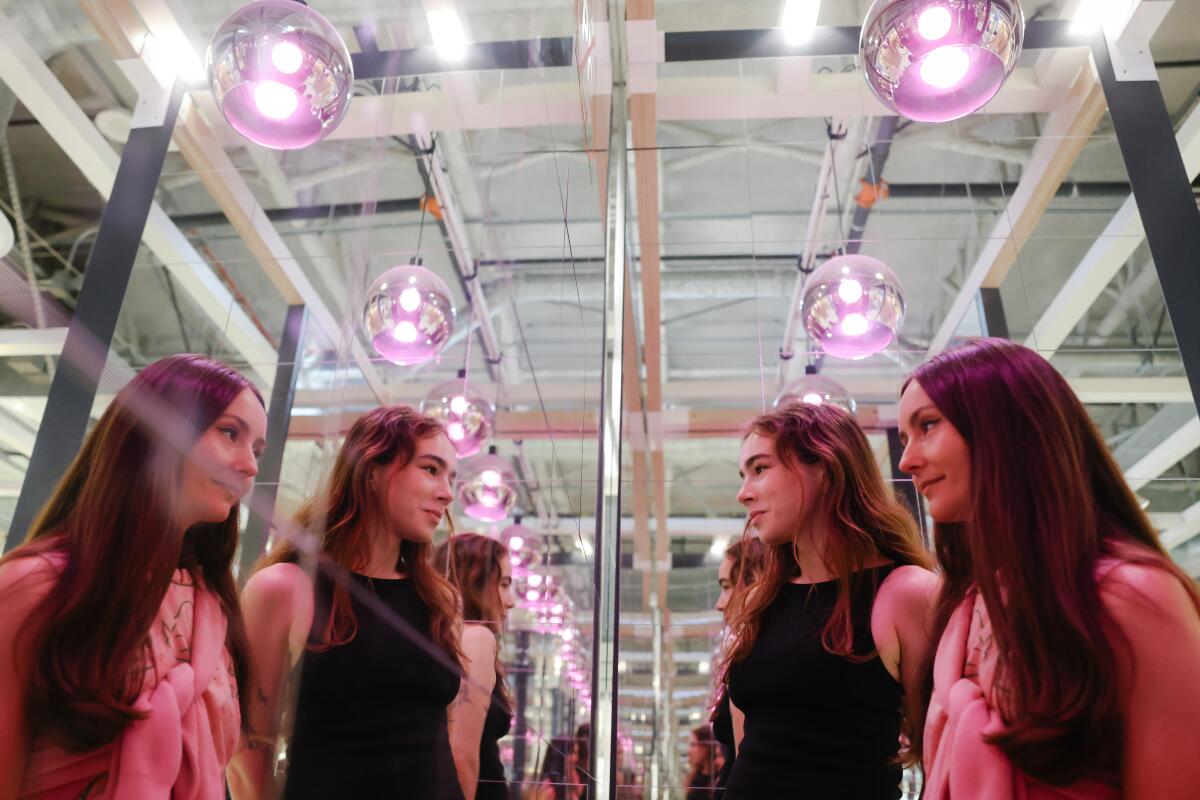As workers across L.A. continue to strike, music uplifts the picket lines
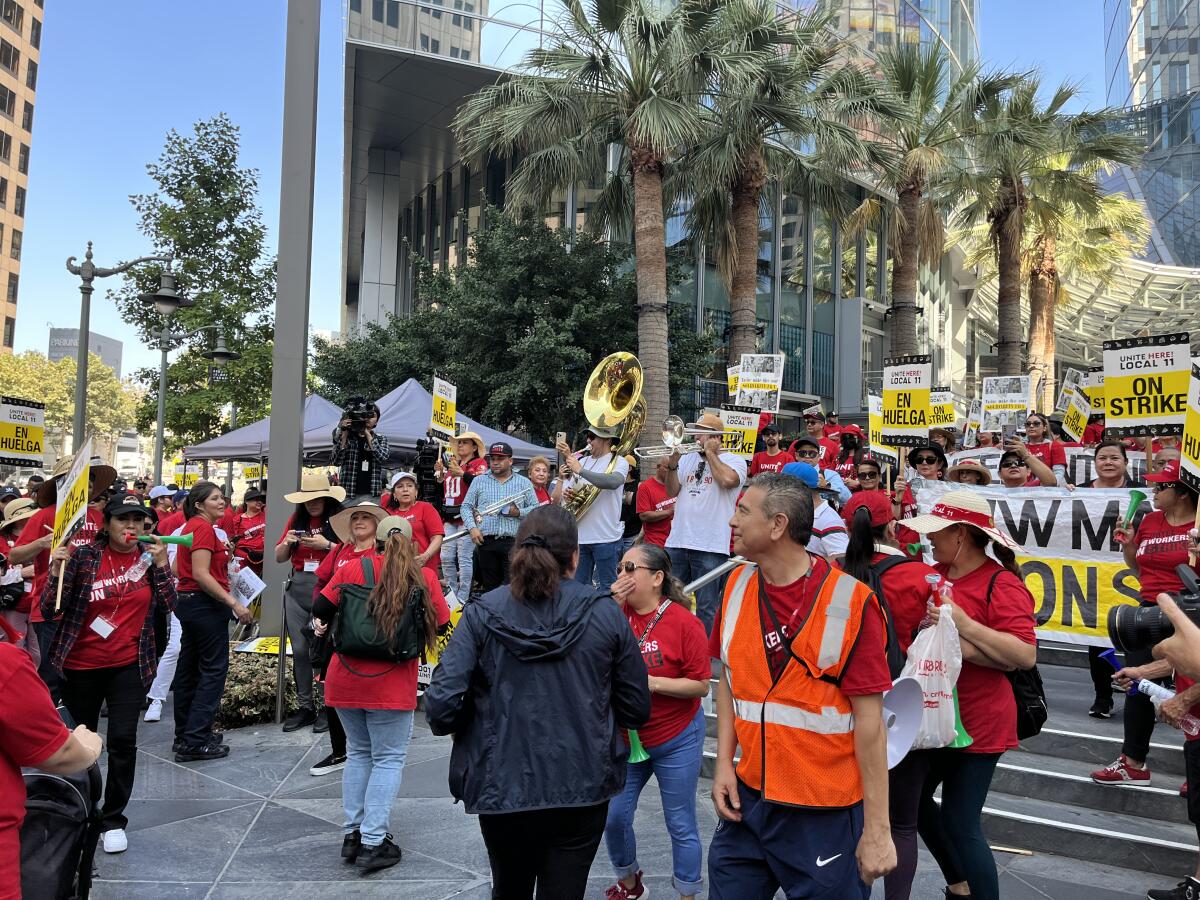
- Share via
Good morning. It’s Friday, Oct. 27. Here’s what you need to know to start your day.
- As workers across L.A. continue to strike, music uplifts the picket lines
- Maine mass shooting leaves 18 dead
- The best agave bars in L.A.
- And here’s today’s e-newspaper
Sign up for Essential California
The most important California stories and recommendations in your inbox every morning.
You may occasionally receive promotional content from the Los Angeles Times.
The sounds of L.A.’s strikes
Each day, Evan Shafran combs through KTLA, CBS, and FOX reports, trying to find news clips talking about the SAG-AFTRA strike.
“Hold onto your resolve,” Fran Drescher, SAG-AFTRA president says in Shafran’s latest strike-themed mix. “This is our moment of truth.” The beats ramp up before the bass drops into another song.
Shafran has become the de facto DJ of the Netflix picket lines. Every morning, he drives 15 miles from his apartment in Shadow Hills to Sunset Boulevard and sets up his subwoofer in front of the company’s headquarters.
Picket lines are best known for chants and slogans. But as workers across L.A. went on strike this summer and fall, music became a consistent presence and pillar of morale for the writers, hotel workers and actors pushing for higher wages and better working conditions. Through music, striking workers have found community and their own subcultures.
“Otherwise, I’d be sitting at my house just sad and depressed and feeling helpless,” Shafran told me. “The music has saved me and I know that it saved a lot of other people.”
The DJ at Netflix
Shafran began DJing when he was growing up in Portland, Maine. A fan of artists like the Beastie Boys, the Roots, Public Enemy and Rage Against the Machine, he credits rock and hip-hop as genres that have shaped his tastes in music. But more importantly, it’s hip-hop’s roots as a political movement that inspire his current work on the picket lines.
“We’re dancing out there together, we’re angry,” Shafran said. A SAG-AFTRA member since 2010, he has struggled to make ends meet with acting roles.
The SAG-AFTRA actors who are still seeking a deal with the Alliance of Motion Picture and Television Producers, picket each day from 9 a.m. to noon. Shafran usually plays songs like Rihanna’s “B— Better Have My Money” and Marvin Gaye’s “What’s Going on,” along with his original DJ mixes. Last week, he commemorated the 99th day of the SAG strike with a mix he calls “99 Problems But Solidarity Ain’t One,” blending in Drescher’s speeches with news clips of actors talking about their experiences.
Samantha Silver, a focus puller based in New York City and a member of Local 600, has shared Shafran’s SoundCloud mixes to her friends across unions.
“At this point, people across the guilds are limping along financially,” Silver said. “It’s nice to come and see people chant or dance and keep moving, even if it’s just a circle around the block.”
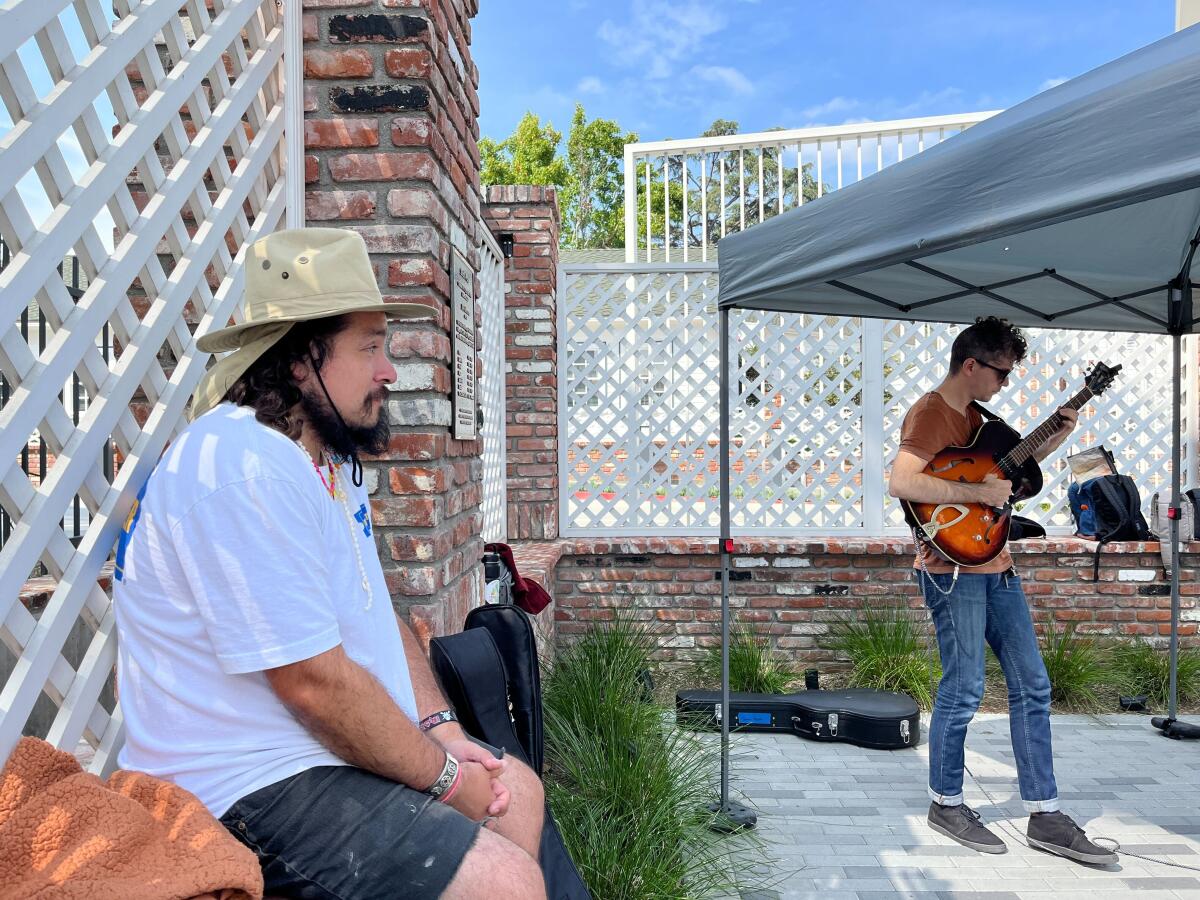
Solidarity showcases at Amazon
Before the strikes, Stephen Harrod was a boom microphone operator on film production crews. These days, he plays a guitar at the Amazon Studios picket line in Culver City. He wanted to channel his skill sets into the protest and organized an open-mic and songwriter showcase in September, days before the Writers Guild of America struck a deal with studios.
“Music shines in those moments of doubt, when you need to feel motivated and when you need to put one foot in front of the other,” Harrod told me. “These people have a lot going on. I kind of think of us as almost musical wallpapers. I want to do something that I feel like I would appreciate if I were out there.”
Local musicians added a bit of extra color for that morning’s extra long picket line, playing original songs or covers underneath a white tent. Bob Dylan protest classics made an appearance.
“We’re drawing on our own personal experiences, to write and share feelings and emotions. And that’s what the writers do,” he said.
Zapateado at hotel rallies
Meanwhile, for striking hotel workers, the sounds of pots and pans as well as Sousaphones have become recognizable at rallies and pickets.
“Que queremos? Contracto! Cuando? Ahora!” the striking hotel workers in bright red Unite 11 shirts yelled in a call and response at a downtown Los Angeles rally in August. As the rally ended, workers paired up for the Zapateado, a traditional Mexican dance, to the music of the assembled live band.
The majority of the hotel workers who are striking identify as Latina women. From cumbia, to salsa, to banda and zapateado, the workers have brought music and dances from their cultures.
Maria Hernandez, a spokesperson for the Unite Here Local 11 union for the hotel workers, says that the union hired a band for marches to boost morale.
“They wanted music and they wanted to celebrate the fact that they are fighting for themselves, fighting for their families,” she told me. “It’s just been an opportunity in a way for our members to find joy in the struggle, find joy in the fight, and to keep going.”
Today’s top stories
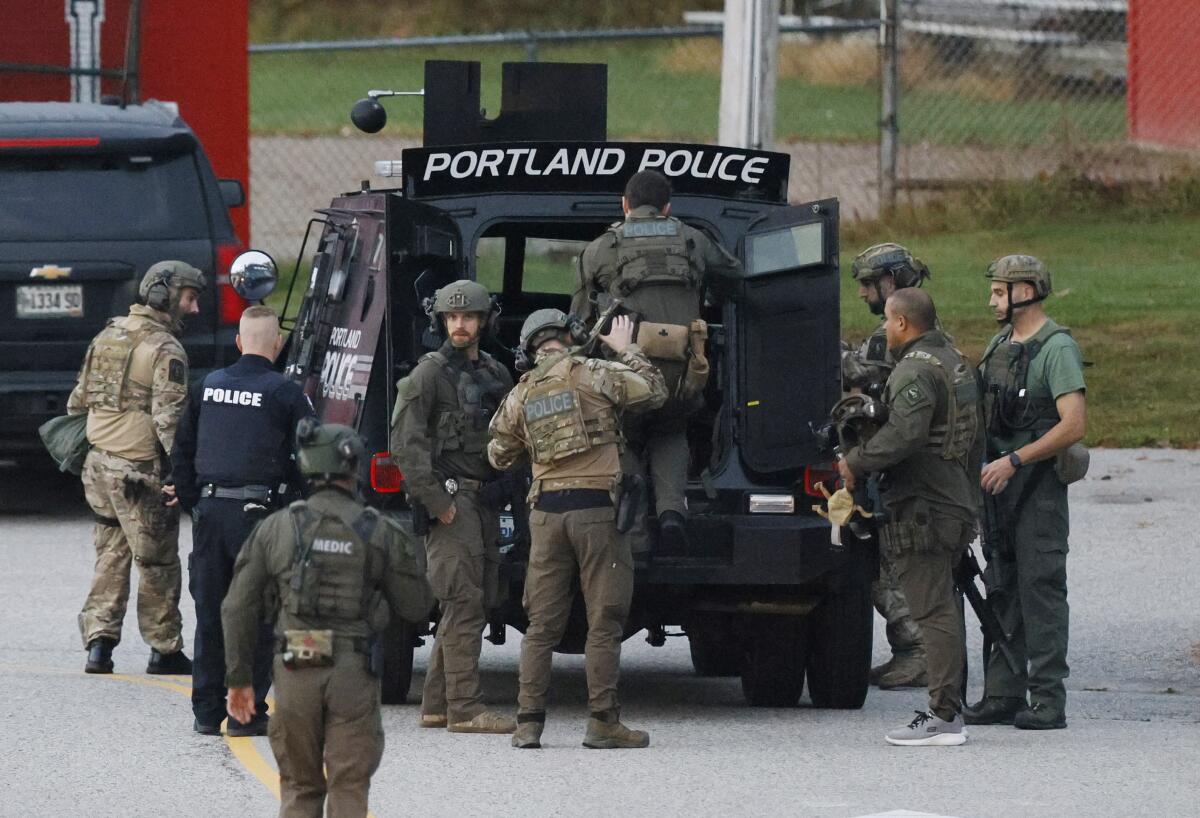
- Maine mass shooting leaves 18 dead; shelter-in-place orders were extended as the manhunt expands.
- ‘There’s no processing this’: Relative of 2 Maine shooting victims tells of hopes dashed.
Labor news in California
- California Supreme Court ends Disneyland’s fight against Anaheim wage law.
- Koreatown grocery store workers protest CEO’s anti-union tactics at conference.
Health
- A pilot’s ‘breakdown’ is a reminder: Many fear seeking mental health help, advocates say.
- California kids have among the worst teeth in the U.S. Halloween candy isn’t the only culprit.
- New COVID vaccines are here: Now’s the time to get one, officials say.
Politics
- Here’s why prosecutors are focused on a rural Georgia county in Trump’s 2020 election case.
- Republicans hoped to downplay abortion bans. The new antiabortion speaker makes that harder.
Sports
- LeBron James dominates late to power Lakers’ comeback win over Suns.
- Matthew Stafford’s wife rips rapper Blueface for turning SoFi suite into a strip club.
- Thriving on the edge of destruction, UCLA’s Laiatu Latu is an unstoppable force.
More big stories
- ‘Kidnapped from Israel,’ artists’ posters say. Some are being torn down.
- ‘Two hours of hell:’ At least 27 are dead in Mexico after Hurricane Otis pounds Acapulco.
- La Luz del Mundo leader was indicted on new federal sex charges.
- What caused a speeding BMW to crash, killing 4 Pepperdine students? Dueling claims amid murder charges.
- A mountain lion attack on a person and a dog temporarily closes Solstice Canyon in the Santa Monica Mountains.
- A Cruise car hit a pedestrian. The company’s response could set back California’s new robotaxi industry.
- Arrowhead bottled water company sues to continue piping from a California forest.
- Venezuelan immigrants are ostracized in Colombia amid xenophobia and shifting politics.
- Sharp curves and speeding cars: Pacific Coast Highway in Malibu takes a deadly toll.
Get unlimited access to the Los Angeles Times. Subscribe here.
Commentary and opinions
- Gustavo Arellano: From the state Assembly to the California Air Resources Board, Hector De La Torre makes his mark.
- Bill Shaikin: Deep in the heart of Texas? Clayton Kershaw has big call to make.
- Opinion: Here are the places that could become too hot for humans due to climate change.
- LZ Granderson: Republican hate for LGBTQ+ people fueled Mike Johnson’s rise to be House speaker.
- Sammy Roth: Can Los Angeles lead the world on climate? We’ll soon find out.
- Mary McNamara: In Malibu, the myth of the open road creates a bloody reality: PCH is a death trap.
- Opinion: Our failed immigration policy is causing a child labor epidemic in the U.S.
- Editorial: Social media can harm kids. Lawsuits could force Meta and others to make platforms safer.
- JP Brammer: Latinos have become the majority in Texas. The monolith myth is being put to the test.
Today’s great reads

A stone, a bullet, a burial. A Palestinian boy’s death in the West Bank signals wider unrest. Ali Khazneh’s death was another in the worst surge of violence to have swept the West Bank in some 15 years. In the weeks since Oct. 7, when the Palestinian militant group Hamas killed more than 1,400 Israelis, Israel has focused on Gaza, where it is widely expected to launch a ground invasion.
Other great reads
- For Native viewers, ‘Killers of the Flower Moon’ is an imperfect triumph.
- Dusty Baker, who won the World Series as Dodger player and Astro skipper, retires after 26 years as manager.
How can we make this newsletter more useful? Send comments to essentialcalifornia@latimes.com.
For your downtime
Going out
- 🔵 🟡 Why so many L.A. creatives meet up at a secret, underground spot: Ikea.
- 🥾Whether you pronounce it ‘Los FEE-lus’ or ‘Los Fey-LEASE,’ this walkable hub is one you’ll never want to leave.
- 🥃 A mecca for mezcal: These are the best agave bars in L.A.
Staying in
- 💀Is the real world not scary enough? Try these new horror and thriller series instead.
- 📺 Bah, humbug! ‘The Holdovers’ is a clunky, phony white-elephant gift of a movie.
- ✏️ Get our free daily crossword puzzle, sudoku, word search and arcade games.
And finally ... a great photo
Show us your favorite place in California! Send us photos you have taken of spots in California that are special — natural or human-made — and tell us why they’re important to you.
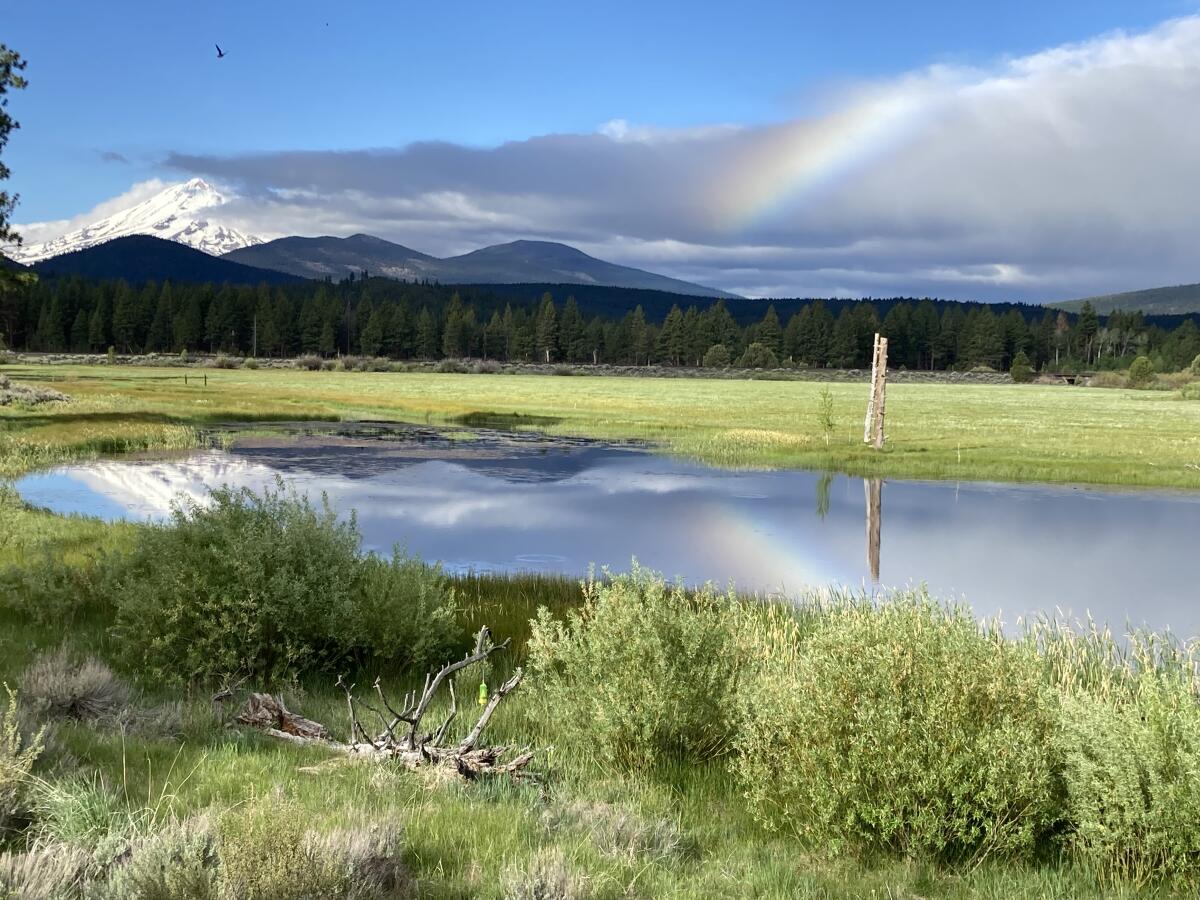
Today’s great photo is from Loch Jones of Macdoel: a view of Mt. Shasta. Loch writes:
I lived in L.A. for 40+ years and finally was able to return to the family ranch [in Leaf, Calif.] where we built the first house ever on this property (just under 1k acres). In L.A., there were 2.5 million people within 20 minutes of my home. Within that same distance here, there are approximately 14. Both areas are so different and within California. At night, we can’t see another man-made light and we can see for miles.
Have a great day, from the Essential California team
Helen Li, reporting fellow
Elvia Limón, multiplatform editor
Kevinisha Walker, multiplatform editor
Laura Blasey, assistant editor
Check our top stories, topics and the latest articles on latimes.com.
Sign up for Essential California
The most important California stories and recommendations in your inbox every morning.
You may occasionally receive promotional content from the Los Angeles Times.
